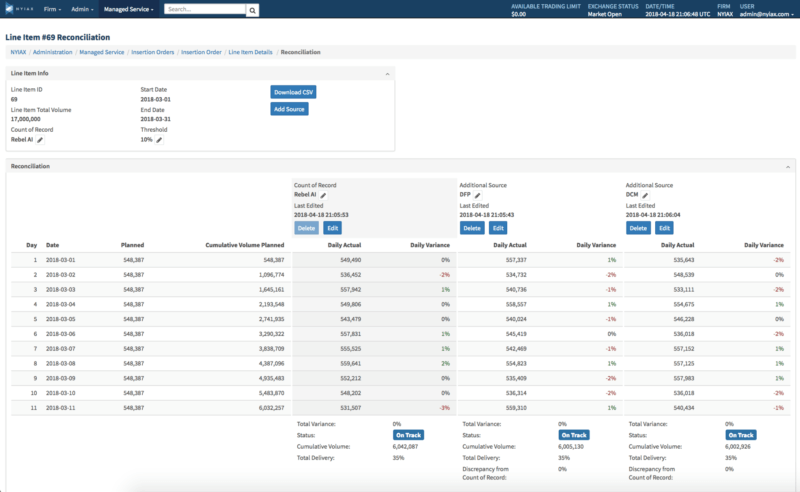NYIAX ‘completes the loop’ with cryptographic ad verification from Rebel AI
The new partnership between the blockchain-based ad contract marketplace and the blockchain-based verification service is essentially operational.

NYIAX is a kind of back-to-the-future use of blockchain tech for advertising.
Instead of attempting to mirror the lightning-fast processing speeds of current programmatic digital advertising — blockchain protocols like Ethereum are very slow in terms of real-time transactional processing — NYIAX is employing blockchain as a shared, permanent ledger to record smart contracts for ad placement.
These contracts are similar in concept to those veterans of TV and radio advertising known as insertion orders, and they set up the terms for a future placement of digital ads in a digital property like a website. The ads themselves will then be served by any ad server.
Today, NYIAX — which is ramping up operations toward a full launch as early as next month for buying, selling and re-trading ad contracts — is announcing a “preferred partnership” that completes the picture.
The partnership is with Rebel AI, a Louisville, Colorado-based startup that also employs blockchain, but on the other end: delivery.
Rebel uses the cryptographic capability of blockchain’s wallet component to verify that inventory that claims to be on, say, The New York Times website, is in fact on that site.
The Interactive Advertising Bureau’s ads.txt effort is also designed to counter domain spoofing, where fake inventory leads to ads being shown on sites different from what the advertiser was led to believe.
In ads.txt, a text file is posted on the publisher’s website, showing the names and ID numbers of the only supply-side platforms (SSPs) or other venues authorized to represent that publisher’s inventory.
But Rebel AI founder and CEO Manny Puentes pointed out to me some of the shortcomings of ads.txt. For instance, publishers don’t always immediately update their ads.txt file when they have new, authorized representatives. Or one SSP might legitimately represent the inventory from another SSP, but that relationship is not accurately represented in the text file.
Instead, Rebel AI verifies that specific inventory actually comes from the claimed site by means of a public/private key match. The ad delivery script for an ad contracted through NYIAX is encrypted, and it can’t be decrypted unless the authorized publisher has a matching key.
Puentes told me this ensures that “the ad will never be delivered to the wrong site.” Here’s a verification offered by Rebel:
Additionally, Rebel AI uses cryptographic signatures to verify that the ad was delivered to a given page. While the Ethereum blockchain protocol used by Rebel is too slow for real-time processing, the transactions are batch-processed on a daily basis to the blockchain, thus providing a permanent and accessible record of the domain and the delivery.
NYIAX VP of Technical Operations Ben Feldman told me that his company is “agnostic” about verification methods employed for ads contracted through its marketplace and that it will offer other verification services, such as Moat or Integral Ad Services.
But, he noted, while blockchain-based domain and ad delivery verification is being discussed by a number of startups, “Rebel is the only one in production now with crypto verification.”
“It does complete the loop,” he added.
Marketing Land – Internet Marketing News, Strategies & Tips
(42)




